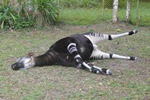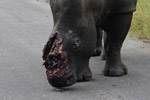The Chinese Premier, Li Keqiang, has pledged $10 million [see note below] to combat poaching in Africa during a visit to the African Union headquarters in Addis Ababa. The fund is a part of a much larger loan package for the continent from China, totaling $10 billion in credit and $2 billion in aid.
The wildlife-rich continent is in the midst of a poaching crisis. Experts estimate that 22,000-35,000 elephants are killed every year by poachers, while last year over 1,000 rhinos were slaughtered in South Africa alone for their horns. Much of the ivory and rhino horn is destined for China or other countries in East Asia. While receiving less media attention, booming bushmeat markets are also taking their toll on Africa’s great apes, monkeys, small mammals, and birds.
Over the last couple decades, China has rapidly increased its presence in Africa through various industrial and development projects, including large-scale fossil fuel projects. Yet, this has also opened up China to criticism that it was consuming Africa’s natural resources for its own ends and negatively impacting the continent’s environment.
In addition to pledging funds, Keqiang, also said China would share high-speed rails technology with the continent.
“We have a dream that all African capitals are connected with high-speed rail, so as to boost pan-African communication and development,” he noted. “China is ready to work with Africa ‘to make this dream come true.'”
|
CORRECTION: Initially this article reported that China had pledged $100 million, not $10 million, for wildlife. However, this was based on state media reports. In fact, the transcript of the speech says $10 million. |

African elephant in Namibia. Photo by: Rhett A. Butler.
Related articles
Featured video: elephant advocates ask Antiques Roadshow to stop appraising ivory
(04/30/2014) The 96 Elephants campaign has asked the television program, Antiques Roadshow, to stop airing appraisals of ivory, even if it is antique. To help convince the PBS program, the campaign produced a satiric video capturing not the worth of ivory, but its cost.
Okapi-killing warlord shot dead in the Democratic Republic of the Congo

(04/17/2014) The head of an informal militia and poaching group, Paul Sadala a.k.a. ‘Morgan,’ was killed on Monday after surrendering himself to the army in the Democratic Republic of the Congo (DRC). A well-known elephant poacher and terrorist, Morgan became most famous for leading an attack on the Okapi Wildlife Reserve station in 2012.
How locals and conservationists saved the elephants of Mali amidst conflict and poverty

(04/02/2014) At a time when Africa’s elephants are facing a relentless poaching crisis, one community has managed to safeguard their elephants in the most unlikely of places: Mali. In a country that has suffered from widespread poverty, environmental degradation, and, most recently, warfare, a collaboration between conservationists and the local community has kept Mali’s elephants from extinction.
Over 9,000 primates killed for single bushmeat market in West Africa every year

(03/24/2014) Over the past 25 years, West Africa’s primates have been put at risk due to an escalating bushmeat trade compounded with forest loss from expanding human populations. In fact, many endemic primates in the Upper Guinea forests of Liberia and Ivory Coast have been pushed to the verge of extinction. To better understand what’s happening, a recent study in mongabay.com’s open-access journal Tropical Conservation Science investigated the bushmeat exchange between these neighboring countries.
Howard G. Buffett puts $24M toward saving rhinos
(03/21/2014) Howard G. Buffett, the son of Berkshire Hathaway chairman Warren Buffett, has pledged $23.7 million to South African National Parks to help fight rhino poaching in Kruger National Park, reports Reuters.
Rhino with bullet in its brain and hacked off horn wanders for days before being put down

(03/05/2014) Last week, visitors in Kruger National Park came on a horrifying sight of the poaching trade: a rhino, still alive, with its horn and part of its face chopped off. The gruesome photo of the young rhino went viral and sent South African authorities scrambling. Five days after the sighting, South African National Parks (SANParks) has announced they found the rhino and put it out of its misery.
South Africa loses nearly 150 rhinos to poachers so far this year
(02/28/2014) Since the first of the year, South Africa has lost 146 rhinos to poachers or approximately 2.5 rhinos every day. This is a slight dip from last year’s poaching rate, which hit 1,004 for the whole year or 2.75 a day. South Africa is home to more rhinos than any other country on the planet, but the populations have been hit hard by poachers in recent years seeking rhino horn.